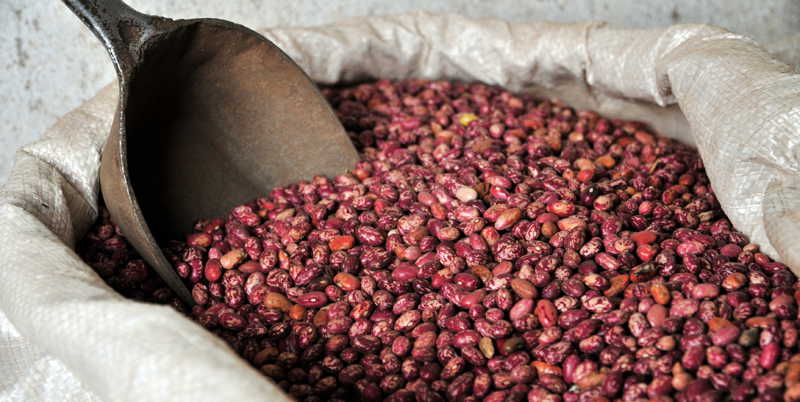High in fibre, folic acid, iron and zinc – beans are great for enriching our diets, especially for pregnant women and growing children. But in rural areas, firewood for cooking is time-consuming to collect and, in urban areas, charcoal is expensive.
By engaging farmers and the private sector to introduce a range of quick-cooking and ready to eat bean products to suit different consumers, a new bean project is set to impact in a number of ways on farmers and consumers across Kenya and Uganda.
“As opposed to two hours with traditional unprocessed dry beans, the new precooked products will take 10-15 minutes to cook,” says Dr. Michael Ugen of the Kenyan National Agricultural Research Organisation (KENRO) and principal investigator for the bean project.
“Generally, the responsibility of collecting firewood and cooking falls to women and children. By reducing the time needed to prepare beans and collect the fuel to do so, valuable time becomes available for women, and as a result the possibilities of using their time for other important activities” adds Dr. Ugen.
From seed to shelf
Dr. Ugen says that the project is working with private sector processors for product development, local supermarkets, agricultural extension workers as well as local government structures.
To date, 47 bean varieties, 15 from Kenya and 32 from Uganda, have been screened and 17 selected for further evaluation and product prototype development. In Uganda, 10 of the 17 initial varieties have been selected for seed production so that farmers can grow the beans on a commercial scale for processing.
In East Africa, bean production is mostly carried out by small-scale farmers with only 0.4 to 0.8 hectares of land per family. Seven thousand farming families have already been selected to participate in the project, 3,000 from Kenya and 4,000 from Uganda.
The project will provide training in better farming practices to produce bean varieties for processing into quick-cooking and ready to eat bean products; and in how to organise better informal groups. This means that groups are registered with local government authorities and are able to develop stronger business relationships with the private sector than as individuals.
“We are also introducing farmer groups to local government, extension workers and microfinance institutions – those who, in the long-run, can help support a sustainable quick-cooking and ready to eat bean market,” adds Dr. Ugen.
Dr. Ugan, however, says that the challenge they have at this stage is making sure farmers have the seeds to cultivate in order to produce enough precooked beans to meet processing demand from their private sector partners.
“We’re looking forward to seeing how farmers groups progress and take advantage of the commercial opportunity presented with bean processing from grains into these quick-cooking and ready to eat products,” he adds.
Appealing to diverse consumers
Joab Ouma, the Business Development Director at Lasting Solutions, a Ugandan commercial agro-processing company, says that the private sector’s role in the new bean value chain is to develop prototype products and packaging for market testing.
“As much as consumers are diverse, they also have a lot in common. For instance, we all eat beans but we often eat beans very differently. Our job is to offer a range of products with a single core ingredient that is available in different pack sizes and sometimes even modify the branding to appeal to our different consumer groups,” says Ouma.
Dr Ugen says that a consumer analysis has been completed and four consumer groups and target markets of focus have so far been identified. These top-end consumers, sustainable middle consumers, vulnerable middle consumers and bottom-end consumers.
“For instance, ‘sustainable middle’ urban consumers are preferring quick-cooking and ready to eat beans mixed with sauces, such as tomato, which are easily cooked and ready-to-eat within minutes. Vulnerable middle and bottom-end consumer groups, which tend to be more rural households, prefer plain, ‘wet’ quick-cooking beans to decide how best to prepare them. Whereas top-end and travelling consumers prefer ready-to-go nutritious snack products,” explains Dr Ugen. “Following on from successful bean snack tasting trials in supermarkets, we will be asking shoppers for their feedback on the other products we have developed, which include plain ‘precooked’ beans (‘wet’ or ‘dry’) and beans with tomato sauce and other ingredients which are ready to eat, says Dr. Ugen”
The project, which continues until 2017, is being supported by the Cultivate Africa’s Future (CultiAF) Fund, a USD 15m jointly funded by Canada’s International Development Research Centre and the Australian Centre for International Agriculture Research.
Article by WRENmedia








